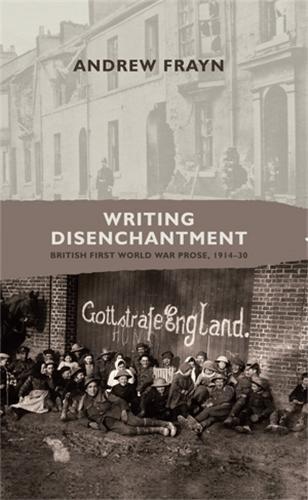Overview
It has become axiomatic that First World War literature was disenchanted, or disillusioned, and returning combatants were unable to process or communicate that experience. In Writing disenchantment, Andrew Frayn argues that this was not just about the war: non-combatants were just as disenchanted as those who fought, and writers such as D. H. Lawrence and Virginia Woolf produced some of the sharpest criticisms. Its language already existed in contemporary sociological and historical accounts of the problems of mass culture and the modern city, whose structures contained the conflict and were strengthened during it. Archival material, sales data and reviews are used to chart disenchantment in a wide range of early twentieth-century war literature from novels about fears of invasion and pacifism, through the modernist novels of the 1920s to its dominance in the War Books Boom of 1928-30. This book will appeal to scholars and students of English literature, social and cultural history, and gender studies. -- .
Full Product Details
Author: Andrew Frayn ,
Rebecca Mortimer
Publisher: Manchester University Press
Imprint: Manchester University Press
Dimensions:
Width: 13.80cm
, Height: 2.30cm
, Length: 21.60cm
Weight: 0.454kg
ISBN: 9780719089220
ISBN 10: 0719089220
Pages: 272
Publication Date: 30 September 2014
Audience:
General/trade
,
General
,
Postgraduate, Research & Scholarly
Format: Hardback
Publisher's Status: Active
Availability: Temporarily unavailable

The supplier advises that this item is temporarily unavailable. It will be ordered for you and placed on backorder. Once it does come back in stock, we will ship it out to you.
Reviews
'A nuanced, sophisticated book that advances its insights through careful readings of works both iconic and very nearly forgotten. The pairing of high modernist with mass-cultural novels is ingenious, and reveals the overarching coherence of British culture in the Great War.' Stephen Ross, University of Victoria -- . Frayn's study returns us to a war we often think we know much better than we really do. Framing the English literary - both high modernist and mass cultural - reaction to the war in terms of a dialectic between enchantment and disenchantment, he challenges received wisdom about how Britons felt about the Great War and its aftermath. The account that sees a trend from pre-war enchantment through horror and post-war disenchantment is here placed in context, challenged, and textured. The result is a nuanced, sophisticated book that advances its insights through careful readings of works both iconic and very nearly forgotten. The pairing of high modernist with mass-cultural novels is ingenious, and reveals the overarching coherence of British culture in the Great War even as the book traces the intricate variations in how the war shaped - and was shaped by - a public vacillating - often blindly and from moment to moment - between enchantment and disenchantment. Stephen Ross, University of Victoria -- .
'A nuanced, sophisticated book that advances its insights through careful readings of works both iconic and very nearly forgotten. The pairing of high modernist with mass-cultural novels is ingenious, and reveals the overarching coherence of British culture in the Great War.' Stephen Ross, University of Victoria -- .
Author Information
Andrew Frayn is Lecturer in Twentieth-Century Literature and Culture at Edinburgh Napier University




